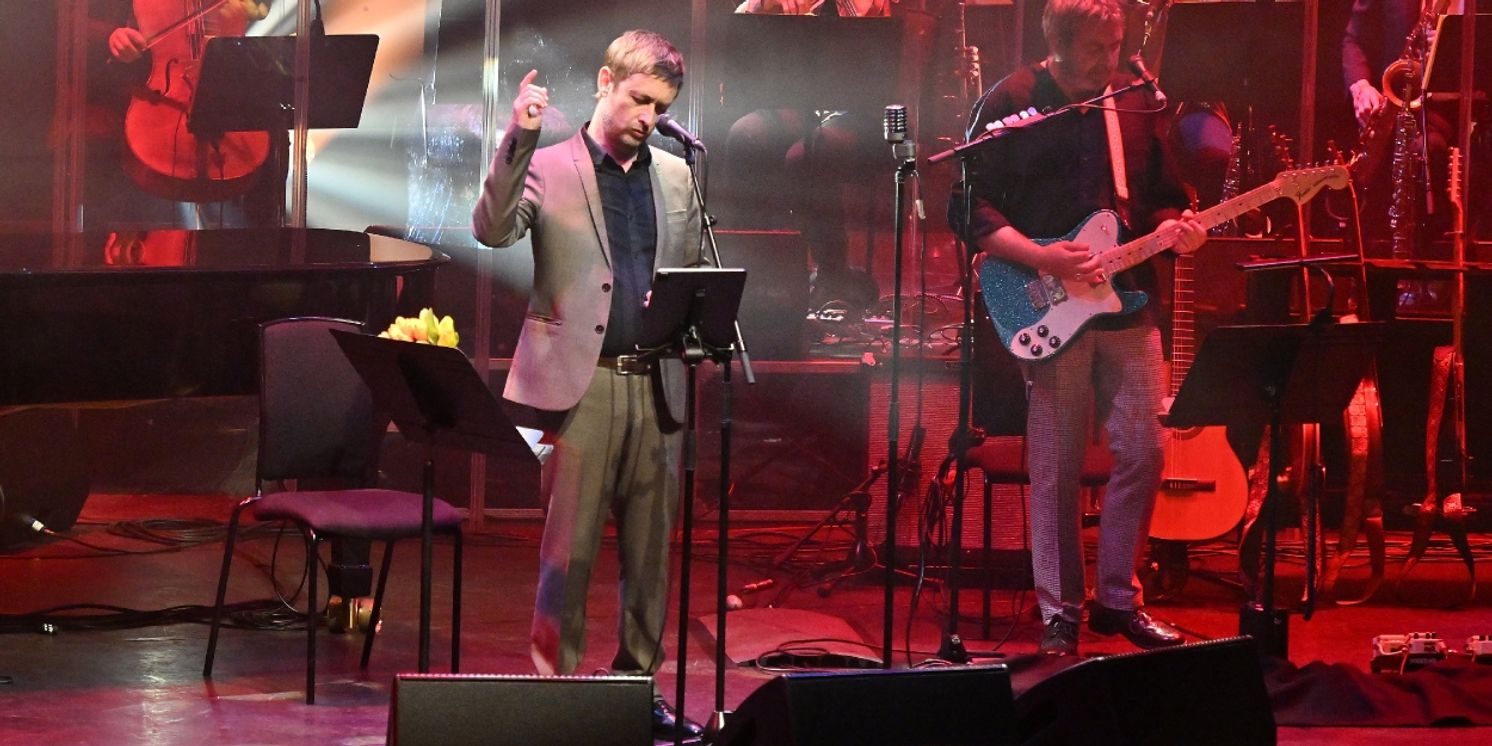Review: VENUS, CUPID, FOLLY, & TIME: 30 YEARS OF THE DIVINE COMEDY, The Barbican Centre
Celebrating thirty years of cerebral pop, The Divine Comedy return to the Barbican to pick up where they left off in 2020.

![]() Celebrating thirty years of cerebral pop, The Divine Comedy return to the Barbican Centre to pick up where they left off in 2020.
Celebrating thirty years of cerebral pop, The Divine Comedy return to the Barbican Centre to pick up where they left off in 2020.
The pandemic scuppered frontman Neil Hannon's original plan for a five-night residency covering their back catalogue at the rate of two albums per night. Undaunted, he's has dusted himself off, assembled an eleven-piece band and come back to fulfil what he fancifully calls Venus, Cupid, Folly, & Time: 30 Years of the Divine Comedy.
That title is peak Hannon, referencing as it does one of his favourite classical works, in this case a sixteenth-century Agnolo Bronzino painting that the Derry-born singer says "sums up everything I've written about: sex, love, a lot of folly and the passing of time." Quite.
After a burst of success in the late Nineties, Hannon fired his backing musicians in 2002 and since then has been the sole constant member of The Divine Comedy. He was far from alone in the Britpop era in operating as a solo auteur with a revolving cast of bandmates - Ian Broudie's The Lightning Seeds, Matt Johnson's The The and any of Stephin Merritt's numerous projects are all fine examples. Hannon's particular mission to create art-inspired ballads did not sit easily in an age when the public gorged on the spiky Spice Girls, tabloid favourites Oasis, cult charmers Pulp and the post-punk antics of Blur. Instead, he ploughed his own furrow with a series of quirky radio-friendly singles, poking fun at the likes of National Express journeys, extolling love in all its forms and giving classic TV series Father Ted an immortal theme tune.
We attended the second night which featured their first major success, 1996's Casanova as well as its spry follow-up A Short Album About Love. Opening track "Something For The Weekend" is a footstomping tale of lust, deceit and a mysterious woodshed with the typical Hannon nod to times long gone by (the title refers to what barbers used to euphemistically call the condoms they offered to their male customers at the end of the cut). The pace doesn't let up with "Becoming More Like Alfie"; glasses may no longer be free on the NHS but this song kicks like an angry mule once it gets going.
The remainder of the album delivers two more bona fide hits in "The Frog Princess" and the Father Ted theme "Songs of Love" amid a morass of more meandering numbers which only go to highlight why The Divine Comedy is still thought of primarily as a singles band.
The second half of the show rolls out A Short Album About Love in similar fashion: the first two songs "The Pursuit Of Happiness" and "Everyone Knows That I Love You" are met with a raucous reception followed by some polite head-bobbing and appreciative applause until Hannon, joking that he doesn't want the audience to go away short-changed, dives into the first encore with some classics that get the blood pumping again. "I've Been To A Marvellous Party" riffs off the same kind of music being played in the Barbican's current theatre production of Anything Goes, "Gin Soaked Boy" has hooks that you can catch whales with and a rare outing for "My Lovely Horse" is the Chantilly cream on this delicious cake of a concert. The second encore is the usual mixed bag of "To The Rescue" (a dancefloor clearer if ever there was one) followed by the epic "Tonight We Fly".
The band behind and around Hannon is a perfect reflection of his art school approach to pop with an almost even split between modern rock musicians and a classical section of wind and strings. The forthright young man who originally blasted these songs in venues no longer around now sits on a chair for decent chunks of the gig, sipping red wine and reading (and sometimes mis-reading) lyrics from a tablet.
Hannon was 25 when Casanova came out and he readily admits that, a quarter century on, his vocal ability isn't quite what it was, especially when it comes to the high notes. He's lost some range but also some of his attitude: lyrics laden with delightful cynicism and delivered in the Nineties with an unapologetic and upbeat charm now emerge occasionally with a veneer of smug sarcasm. The youth who was desperate to love and be loved at any cost comes across here as a middle-aged man who wonders what on earth the fuss was really all about.
This doesn't take away from the dramatic impact and powerful delivery of Hannon's epoch-defining songs which sound as invigorating now as they did then nor his brave musical vision which ultimately did not give him all he wanted. He refers in the show to his failed attempt wanted to break America; instead, it seems America broke him in the early years of this millennium. He lost his way for a while after dismissing his band only to return with a less rosy view on life, creating some beautifully written and poignant songs of loss and heartbreak every bit as wonderful as his more celebrated early output. Those catching the remainder of the shows are in for a treat.
The Divine Comedy continues at The Barbican Centre until 4 September.
Photo credit: Mark Allan/The Barbican
Reader Reviews
Videos

